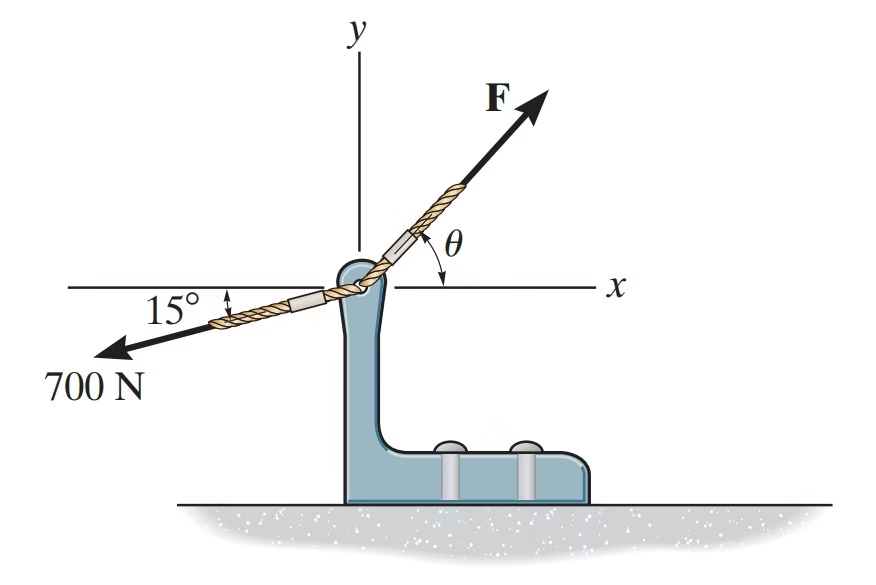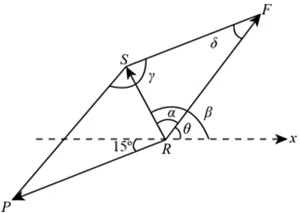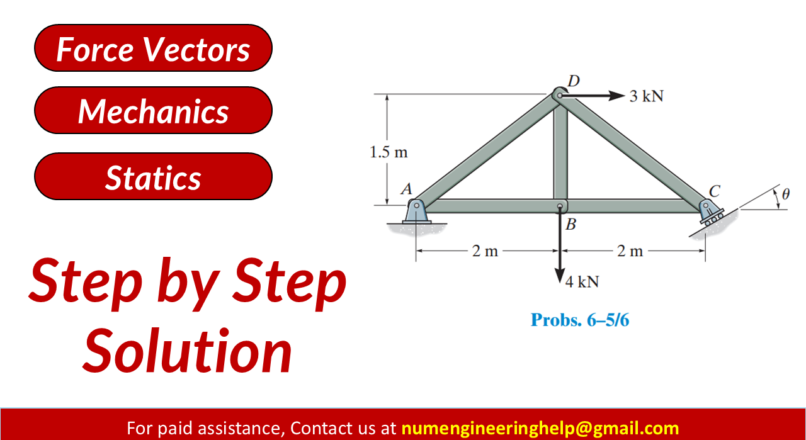If $\theta = 60^\circ$ and $F = 450 \, \text{N}$, determine the magnitude of the resultant force and its direction, measured counterclockwise from the positive $x$ axis.

Step by Step Solution
$ \text{Step 1: Given Data} $
Given that the angle $\theta = 60^\circ$, and the force $F = 450 \, \text{N}$, we are required to determine the resultant force and its direction, measured counterclockwise from the positive $x$-axis.
$ \text{Step 2: Construct the Parallelogram} $
To proceed, we construct parallel lines from the force vectors to form a parallelogram, as shown below.

$ \text{Step 3 :Calculate the Angle Between Forces} $
By geometry, we can determine the angle between the forces. The angle between the forces can be calculated as:
\begin{array}{c}
a_n = 180^\circ – 60^\circ + 15^\circ \\
= 135^\circ
\end{array}
$ \text{Step 4: Apply the Law of Cosines} $
Next, we apply the law of cosines to calculate the resultant force. The law of cosines is given by:
\begin{array}{c}
F_R = \sqrt{F_R^2 + P_R^2 – 2 \times F_R \times P_R \times \cos(180^\circ – a_n)}
\end{array}
$ \text{Step 5: Substitute Known Values} $
Substituting the known values into the above equation:
\begin{array}{c}
F_R = \sqrt{(450 \, \text{N})^2 + (700 \, \text{N})^2 – 2 \times (450 \, \text{N}) \times (700 \, \text{N}) \times \cos(180^\circ – 135^\circ)} \\
= 497.0 \, \text{N}
\end{array}
$ \text{Step 6: Calculate the Angle δ } $
The angle $\delta$ can be calculated as:
\begin{array}{c}
\delta = \frac{360^\circ – 2 \times 135^\circ}{2} \\
= 45^\circ
\end{array}
$ \text{Step 7: Solve for Angle α} $
Substituting the value of $a_n = 135^\circ$:
\begin{array}{c}
\delta = \frac{360^\circ – 2 \times 135^\circ}{2} \\
= 45^\circ
\end{array}
$ \text{Step 8: Substitute Values into the Sine Rule} $
We now apply the sine rule to calculate the angle $\alpha$. The sine rule is given by:
\begin{array}{c}
\frac{\sin \alpha}{RP} = \frac{\sin \delta}{RS}
\end{array}
Solving for $\alpha$, we get:
\begin{array}{c}
\sin \alpha = \frac{RP \times \sin \delta}{RS}
\end{array}
\begin{array}{c}
\alpha = \sin^{-1} \left( \frac{RP \times \sin \delta}{RS} \right)
\end{array}
$ \text{Step 9: Determining the Final Angle} $
Substituting the values into the equation:
\begin{array}{c}
\alpha = \sin^{-1} \left( \frac{700 \, \text{N} \times \sin 45^\circ}{497 \, \text{N}} \right) \\
= 84.8^\circ \\
\approx 58.6^\circ
\end{array}
$ \text{Step 10: } $
\begin{array}{c}
\lambda = \alpha + 60^\circ \\
= 58.6^\circ + 60^\circ \\
= 118.6^\circ
\end{array}

Leave a reply